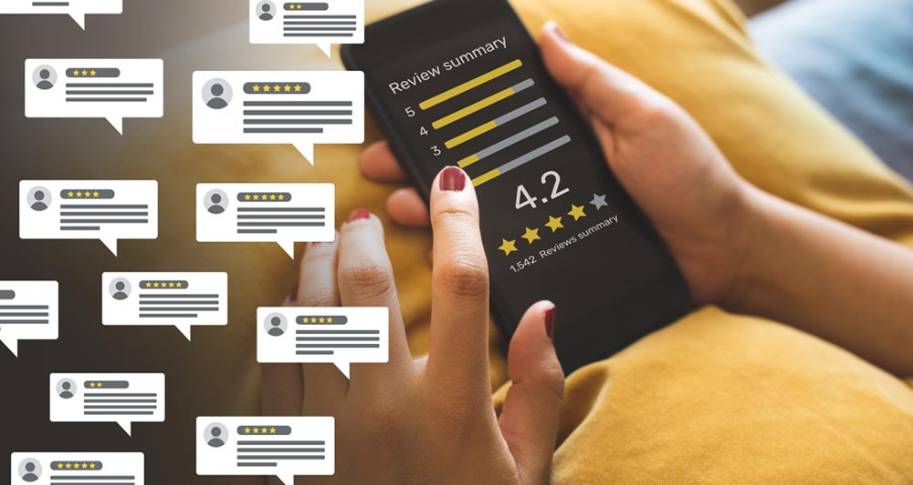Damage Control: When Are Bad Reviews Harmful?

October 2, 2020 | By Ryan Decker
Researchers: Dinesh Gauri
In a world where reputation is everything, negative reviews can cause major harm.
If consumers gave scathing reviews of some of the wonders of the world – saying this of the Grand Canyon: “More like ‘Mediocre Canyon’” and this of the Eiffel Tower: “Just a brown lump of metal, nothing special” – what hope is there for any business?
Online consumer review platforms like Yelp, TripAdvisor, and Angie’s List have changed the way consumers shop. Electronic word of mouth (eWOM) is extremely powerful in influencing customer behavior. While a few negative reviews wouldn’t discourage most people from visiting the Eiffel Tower during their vacation to France, restaurants and other service businesses may not be so lucky.
Online reviews of services are growing rapidly as consumers hope to reduce uncertainty about a service’s quality. Nearly 95% of shoppers read online reviews before buying a good or service.
Unsurprisingly, good reviews are great for business. For restaurants, an extra rating star on Yelp increased revenue by up to 9%. Negative reviews, however, can have detrimental consequences. Consumer complaints and negative reviews have been shown to diminish future stock returns and convince consumers to avoid a particular business.
While a bad review may seem like the end of the world, research shows that there may be more to the story. In their paper, “Negative online reviews and consumers’ service consumption,” Alireza Golmohammadi (University of Tulsa), Anna Mattila (Penn State University), and Dinesh Gauri (University of Arkansas) investigate how consumers respond to negative electronic word-of-mouth (eWOM) and how contextual factors influence their decisions.
e-WHAT?
Traditional word-of-mouth is the oldest form of promoting products and services. Before the internet, businesses relied on person-to-person oral communication. These messages could only reach a few individuals and would essentially disappear once spoken. Now that consumers can post anything and everything on the internet, their messages can reach more people and remain relevant for much longer periods of time. Whether this electronic word-of-mouth (eWOM) takes the form of online reviews, social media posts or blogs, it is extremely impactful on consumer behavior.
eWOM affects the movies we watch, the music we listen to and the products we buy online. Research has even shown that negative information is more impactful, more credible, and more helpful than positive information.
“Although past research generally points to the strong impacts of negative eWOM,” the authors write, “…we introduce behavioral sunk costs and psychological distance as two contextual factors that, together, might alter the impact of negative eWOM.” How much time and effort someone has already put into a decision, how soon they plan on deciding, and how uncertain they are about their choices may change how negative eWOM is received by consumers. Further, the authors question if forum consensus, such as overwhelmingly positive or negative reviews, impacts behavioral intentions.
Just Can’t Quit
“One of the important factors that shape consumers’ pre-purchase and post-purchase behavior is their behavioral investments in information search,” the authors state. The sunk cost fallacy states that “investments in money, effort or time to a course of action can lead to a tendency to continue that course of action” regardless of the future value of that action. Consumers are well-aware of their investments (of money, time, effort, etc.) and don’t want those resources to go to waste. Individuals will likely continue the same course of action even if it will fail.
This common view of sunk costs greatly impacts consumer behavior. Service research shows that when consumers put effort into researching an option, they are less likely to switch to another alternative. This is particularly true for services due to their experiential nature. The authors raise an intriguing question: let’s say you spend time looking at a service provider’s (e.g. AT&T’s) website for service offerings and subscription plans. Would you be less likely than a person who has not made such a behavioral investment to be influenced by negative information (such as a bad review) you may encounter later in the decision-making process?
Because of the time and energy they’ve spent already, these consumers will likely give the service provider the benefit of the doubt.
On the Horizon
The authors go one step further to explore the impact of sunk costs at varying levels of psychological distance. Psychological distance describes the disconnect between a consumer and the service they consider purchasing. Consumers are likely to experience psychological distance when making service decisions in a variety of ways. The authors explain that “[consumers] can experience spatial distance (e.g. traveling to a destination which is far away), temporal distance (e.g. booking a hotel room in advance), social distance (e.g. traveling to a destination in a foreign country with a different culture) or uncertainty (e.g. deciding whether to book a hotel in response to potential sell-out risk).”
Psychological distance influences consumers’ evaluations by changing the way they look at a decision. It impacts how they respond to events and consider pieces of information. Individuals think in more concrete and detailed terms of the event when it is perceived as psychologically closer, and more abstract and high-level when distant. The authors contribute to this research by investigating how psychological distance may interact with other variables (such as sunk costs) to influence the effectiveness of negative eWOM. They may react differently to promotional messages or service guarantees, and their overall satisfaction may change.
What’s the Verdict?
To test the impact of sunk costs and psychological distance on consumer behavior, the authors had participants consider subscribing to an online streaming service they would use in either the near or distant future. Depending on the experimental condition, after the participants either spent or didn’t spend time gathering information about a specific service provider, they read reviews from past consumers. The authors then analyzed their purchase decisions.
The results supported the authors’ hypothesis, showing that “when consumers are considering a service consumption in the near future, behavioral sunk costs make them less receptive to negative eWOM and more likely to make a purchase.” For a service consumption experience in the distant future, consumers think more abstractly and worry less about past investments (sunk costs). Consumers who spend more time gathering information about a specific service provider are more likely to purchase their service – even despite negative reviews – if the service consumption is in the near future as opposed to distant future.
These findings generate an interesting follow-up question: if reviews are overwhelmingly negative with little disagreement, does this influence consumers’ reactions to negative eWOM? The next study the authors conducted tests how forum consensus affects consumer behavior.
Weighing the Good with the Bad
When making a pros and cons list, the decision becomes easier if there are many more items on one side or the other. Similarly, the difference in the number of positive and negative online reviews might make purchase decisions easier and increase the impact of eWOM. Negative online reviews are generally more trustworthy when many people say the same thing. That’s why most people would disregard the scathing review of the Eiffel Tower mentioned earlier since the Eiffel Tower averages 4.6 stars with almost 245,000 Google reviews.
To test the impact of forum consensus, the authors examined hotel reviews. When sunk costs are high and consumers don’t feel psychologically distant, overwhelmingly positive or negative reviews don’t impact their decisions that much. For more distant decisions, however, high consensus did have a greater influence on consumers.
The effect of sunk costs for decisions you’re about to make is so strong that it attenuates the impact of an overwhelmingly negative review consensus. This finding provides interesting implications for consumers and service firms as to how decisions are made under the influence of psychological distance and sunk costs. According to this research, service firms should try to draw consumers in to capitalize on the idea of sunk costs, while consumers should read reviews first to resist this effect.
“Our work encourages consumers to check eWOM at the early stages of their decision-making process rather than at the final stages,” the authors write, “when they might have already invested a great deal of time learning about a specific service provider.” For decisions happening in the near future, the more time a consumer invests seeking information about a specific service provider, the less likely they are to be affected by negative reviews. You’ve already spent so much time with the decision, you’re more inclined to just make it rather than spend more time wavering. You are more likely to ignore the negative past experiences of other consumers – even if forum consensus is high. If the negative reviews are accurate, ignoring them could lead to dissatisfaction with the service experience, so the next time you consider making a purchase, read the reviews first.
Damage Control for Service Firms
This research provides important implications for service providers. The authors recommend that service providers should be aware that consumers are more prone to negative eWOM when “(a) they live in a place far from the location where the service is offered, (b) when the consumption is to happen in the distant future, or (c) when consumers haven’t spent much time gathering pre-purchase information.” International hotel companies, wedding planners, moving companies and similar service firms should be especially cognizant of eWOM.
Service providers with a global reach should thus be highly attentive to negative eWOM. Responding to negative reviews and addressing online consumer complaints as soon as possible is an important strategy whose practice these results support.
The authors also suggest that short-term sales may be more effective than long-term offers. When service providers offer sales, such as flash sales with a time limit for consumption, the psychological proximity of the consumption mitigates the impact of negative eWOM.
Finally, firms can take advantage of the role of behavioral sunk costs to protect themselves against negative eWOM. Anything a company can do to engage consumers in an information-gathering process helps to offset the damaging effects of negative eWOM. The authors suggest that by making an interactive website, offering relevant information and using games to draw potential consumers in, businesses may mitigate the damage of negative reviews.


